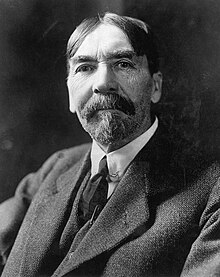Thorstein Veblen
| Thorstein Veblen | |
|---|---|

Thorstein Bunde Veblen (1857–1929)
|
|
| Born |
July 30, 1857 Cato, Wisconsin |
| Died | August 3, 1929 (aged 72) Sand Hill Road, Menlo Park, California |
| Nationality | American |
| Field | Evolutionary economics; sociology |
| School or tradition |
Institutional economics |
| Alma mater |
Carleton College Johns Hopkins University Yale University (PhD, 1884) |
| Influences | Herbert Spencer,William Graham Sumner, Karl Marx, Lester F. Ward, William James, William McDougall, Georges Vacher de Lapouge, Edward Bellamy, John Dewey, Gustav von Schmoller, John Bates Clark, Henri de Saint-Simon,Charles Fourier |
| Influenced | Wesley Clair Mitchell, Clarence Edwin Ayres, John Kenneth Galbraith, C. Wright Mills, Robert A. Brady, Lewis Mumford, Harold Adams Innis, Edith Penrose, John M. Clark, Geoffrey Hodgson, Jonathan Nitzan, Shimshon Bichler |
| Contributions | Conspicuous consumption, Conspicuous leisure, penalty of taking the lead, ceremonial/instrumental dichotomy |
| Signature | |
Thorstein Bunde Veblen (born Torsten Bunde Veblen; July 30, 1857 – August 3, 1929) was a Norwegian-American economist and sociologist. He was famous as a witty critic of capitalism.
Veblen is famous for the idea of "conspicuous consumption". Conspicuous consumption, along with "conspicuous leisure", is performed to demonstrate wealth or mark social status. Veblen explains the concept in his best-known book, The Theory of the Leisure Class (1899). Within the history of economic thought, Veblen is considered the leader of the institutional economics movement. Veblen's distinction between "institutions" and "technology" is still called the Veblenian dichotomy by contemporary economists.
As a leading intellectual of the Progressive Era, Veblen attacked production for profit. His emphasis on conspicuous consumption greatly influenced the socialist thinkers who sought a non-Marxist critique of capitalism.
Veblen was born on July 30, 1857, in Cato, Wisconsin, to Norwegian American immigrant parents, Thomas Veblen and Kari Bunde. He was the fourth of twelve children in the Veblen family. His parents emigrated from Norway to Milwaukee, Wisconsin on September 16, 1847, with little funds and no knowledge of English. Despite their limited circumstances as immigrants, Thomas Veblen’s knowledge in carpentry and construction paired with his wife’s supportive perseverance allowed them to establish a family farm, which is now a National Historic Landmark, in Nerstrand, Minnesota. This farmstead and other similar settlements were referred to as little Norways, oriented by the religious and cultural traditions of the old country. The farmstead was also where Veblen spent most of his childhood.
...
Wikipedia
